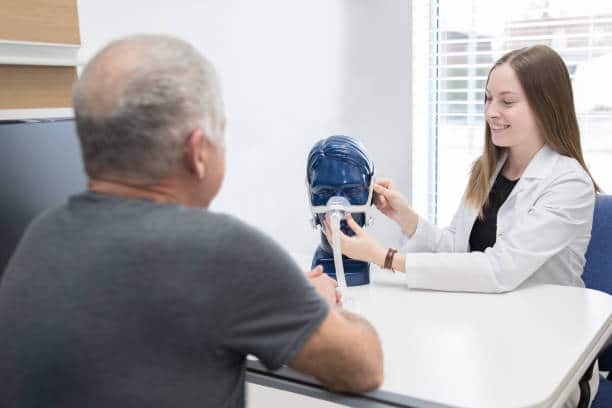Are you struggling to lose weight despite your best efforts? If you suffer from obstructive sleep apnea, a type of sleep disordered breathing, your struggle may be even more challenging.
Research has shown that obstructive sleep apnoea and weight gain are closely linked, and those with mild or severe sleep apnea may find it more challenging to shed pounds.
In this blog post, we’ll explore the science behind how CPAP therapy can affect weight loss, the benefits of CPAP therapy for weight loss, and tips for maximizing the weight loss benefits of CPAP therapy.
If you want to shed some pounds and improve your overall health, keep reading to learn how CPAP therapy can be a game-changer in your weight loss journey.
How Does CPAP Therapy Work?

Continuous positive airway pressure (CPAP) therapy is commonly used for sleep apnea, a condition where a person’s breathing repeatedly stops and starts during sleep. CPAP therapy involves using a machine that delivers a continuous flow of pressurized air to keep the airway open while a person sleeps.
The machine has a CPAP mask that covers the nose and mouth and is worn over the face or nose, delivering a steady stream of air pressure to prevent the airway from collapsing.
This helps to reduce snoring, prevent apnea episodes, and improve the overall quality of sleep. CPAP treatment can also help alleviate other sleep apnea symptoms, such as daytime sleepiness, morning headaches, and difficulty concentrating.
Working with a healthcare provider is important to ensure that CPAP therapy is set up correctly and the machine’s settings are adjusted to an appropriate pressure level to achieve the best possible results.
Also Read: What is a CPAP Machine, and What Does It Do?
The Science Behind CPAP Therapy and Weight Loss
The relationship between sleep apnea and weight gain is well-established, with research showing that those with sleep apnea are more likely to be overweight or obese.
This may be due to factors such as decreased physical activity, poor diet, and metabolism and hormone regulation disruptions. However, CPAP therapy has positively impacted weight loss in those with sleep apnea.
One of the primary ways that CPAP therapy can affect weight loss is by improving sleep quality. Sleep apnea episodes can disrupt sleep, leading to sleep deprivation and reduced energy levels during the day. This can make it more difficult to engage in physical activity and may also increase the risk of overeating and weight gain.
By using CPAP therapy to keep the airway open during sleep, people with sleep apnea can experience better quality sleep and wake up feeling refreshed and energized, leading to more opportunities for physical activity and healthier food choices throughout the day.
CPAP therapy may also impact weight loss through its effects on appetite regulation. Studies have shown that sleep deprivation can increase ghrelin levels, a hormone that stimulates appetite, and decrease leptin levels, suppressing appetite. This can increase hunger and cravings, making sticking to a healthy diet more difficult.
Another way that CPAP therapy can impact weight loss is by improving metabolism and insulin sensitivity. Researchers have linked sleep apnea to insulin resistance, a condition in which the body becomes less responsive to the hormone insulin that regulates blood sugar levels. This can increase fat storage and a higher risk of developing type 2 diabetes.
How Untreated Sleep Apnea Affects Weight

When left untreated, sleep apnea can lead to a myriad of health complications, including weight gain. Therefore, seeking sleep apnea treatment is crucial to address this issue and improve overall health.
- Disrupted sleep cycle: Sleep apnea disrupts the normal sleep cycle, causing frequent awakenings throughout the night. This lack of restorative sleep leaves individuals feeling exhausted and lethargic, decreasing motivation and energy for physical activities, ultimately leading to a more sedentary lifestyle.
Also Read: What is Rapid Eye Movement Sleep?: Its Importance in the Sleep Cycle
- Appetite regulation: Sleep deprivation caused by untreated sleep apnea affects the balance of hormones like leptin and ghrelin, contributing to an increased feeling of hunger and a reduced sense of fullness after eating. This can result in overeating and weight gain.
- Emotional toll: The constant fatigue, irritability, and mood swings associated with sleep apnea can make it challenging to maintain a healthy lifestyle. Individuals may turn to comfort foods as a means of coping, further exacerbating weight gain.
Benefits of CPAP Therapy for Weight Loss
Research has shown that CPAP therapy can provide significant benefits for weight loss, in addition to its primary use of treating sleep apnea. Here are some of the ways that CPAP therapy can help with weight loss:
Improved sleep quality
Sleep apnea episodes can lead to disrupted sleep, contributing to weight gain. By using CPAP therapy to keep the airway open during sleep, people with sleep apnea can experience better quality sleep and wake up feeling refreshed and energized. This can lead to more opportunities for physical activity and healthier food choices throughout the day.
Reduced appetite
Studies have shown that sleep deprivation can increase levels of the hunger hormone ghrelin and decrease levels of the satiety hormone leptin, leading to increased appetite and overeating. By improving sleep quality and reducing sleep deprivation, CPAP therapy may help regulate these hormones and reduce appetite, making it easier to maintain a healthy weight.
Increased energy levels
Sleep apnea can lead to daytime sleepiness and reduced energy levels, making it more difficult to engage in physical activity. By improving sleep quality, CPAP therapy can help people with sleep apnea feel more awake and alert during the day, making it easier to engage in physical activity and burn calories.
Improved metabolism
Researchers have linked sleep apnea to insulin resistance, which may increase fat storage and the risk of developing type 2 diabetes. Studies have shown that CPAP therapy improves insulin sensitivity, reduces the risk of developing diabetes, and may lead to better weight management.
Motivation to make other lifestyle changes
Successfully using CPAP therapy can be a significant accomplishment for those with sleep apnea and may motivate them to make other positive changes, such as exercising regularly or adopting a healthier diet.
Does Sleep Apnea Go Away With Weight Loss?

Excess weight, particularly around the neck and throat area, often causes sleep apnea. This extra tissue can pressure the airway, causing it to become blocked during sleep. Losing weight can reduce the amount of tissue in the neck and throat area, which can help keep the airway open and reduce the frequency and severity of sleep apnea episodes.
Research has shown that even modest weight loss can improve sleep apnea symptoms. One study found that a 5-10% weight loss can significantly improve sleep apnea symptoms in obese patients. Another study found that a weight loss of 10% or more can lead to the remission of sleep apnea in some patients.
However, we should note that excess weight does not cause all cases of sleep apnea. Structural issues in the airway or other underlying health conditions may cause the condition in some cases. In these cases, weight loss may not completely resolve the condition.
Also Read: Sleep Apnea, CPAP Therapy, & Diabetes: What You Need to Know
Conclusion
CPAP therapy can significantly impact weight loss for those with sleep apnea. By improving sleep quality, reducing appetite, increasing energy for physical activity, and improving metabolism and insulin sensitivity, CPAP therapy can be an effective tool for weight loss.
To maximize the weight loss benefits of CPAP therapy, it’s essential to use it consistently, incorporate physical activity into your routine, choose a healthy diet, and monitor progress.
If you’re struggling with weight loss, we encourage you to speak with your healthcare provider about the potential benefits of CPAP therapy. With some help from CPAP therapy, you can achieve your weight loss goals and improve your overall health and well-being.
So why wait? Take action today and start reaping the benefits of CPAP therapy for weight loss.
Frequently Asked Questions
Can CPAP therapy alone lead to significant weight loss?
CPAP therapy alone is not a weight loss treatment, but it can indirectly contribute to weight loss by improving sleep quality and reducing appetite. However, weight loss results may vary depending on individual factors such as overall health, body composition, and lifestyle habits.
Can CPAP therapy improve metabolism?
Sleep apnea has been linked to insulin resistance, which can lead to increased fat storage and weight gain. CPAP therapy has been shown to improve insulin sensitivity and reduce the risk of developing type 2 diabetes, which may also contribute to weight loss.
Does losing weight help sleep apnea?
Yes, losing weight can often help with sleep apnea. Sleep apnea is when a person’s breathing is interrupted during sleep, and excess weight can contribute to the condition.
Discover our range of CPAP accessories to support your journey by visiting our CPAP Wellness Collection on Amazon.



